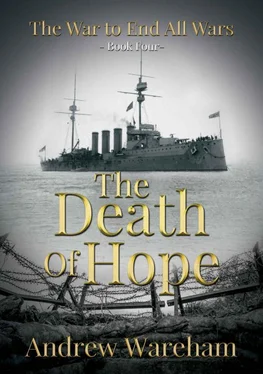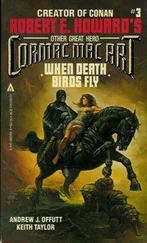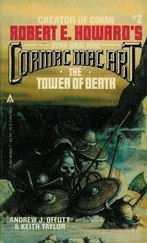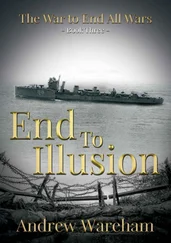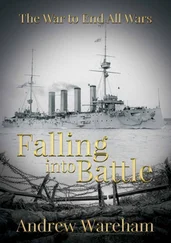General French blamed all of his juniors in turn – they had misunderstood his orders, probably intentionally, had placed the reserves far behind the point he had demanded, had failed to unleash the cavalry, had permitted too short a bombardment. The lieutenant generals in command of the corps that had failed to break through blamed French for launching an ill-prepared, poorly planned battle; simultaneously, they berated the major generals in charge of their divisions for failing to push forward hard enough. The major generals unanimously claimed that the fault lay with the staff who had not planned the battle properly; they then blamed their brigadiers for not fighting the battle correctly on the ground. The brigadiers had no doubt the staff had let them down but gave their colonels a rocket for not making the advances laid down for their battalions.
The colonels had nobody to blame and suffered in official silence. All who had influence wrote Home to complain.
Richard informed Primrose of all that had befallen the battalion, including the casualties, more than a tenth of his men lost to him, dead or too much wounded ever to return to the front. He mentioned that he had now lost six second lieutenants, two lieutenants and one captain, the junior six all dead having marched into the machine guns in the initial assault and tidying up later. He continued in indignation.
‘Wincanton, you will be pleased to hear, was unharmed, having led his men from the front, as was proper, and been first of his company into the German front line. I am informed that he was waving a heavy walking stick and shouting ‘tally-ho, you chaps’ as he jumped into the trench. The stick was bloodstained when I saw him later in the morning. I have been forced to put his name forward for a decoration! I have also no choice other than to make him lieutenant – Brigade has confirmed him in the rank this day.’
He blamed the failure of the battle on the lack of artillery support, due to the shortage of shells. He knew that Primrose’s father, Lord Elkthorn, had some minor role in the Ministry and would make his words heard in government.
General French was less subtle. He informed his pet newspaper correspondents of his complaints, let them publish that all was not entirely well with the artillery while informing their editors and owners of the reality of a massive shortage of ammunition of all calibres. His words were quoted in Parliament, embarrassing Mr Asquith, the Prime Minister, who did not like to be offered blame, much preferring a quieter, gentlemanly existence. He was heard to complain that the damned people seemed to expect him to be responsible for the war.
Lloyd George, Minister of Munitions for some six months, was outraged. He had done much to increase the output of explosives in Britain and had been responsible for buying in massive quantities from America and other neutrals. He had said, repeatedly, that by the spring of ’16, there would be a sufficiency to hand but that no major battles should be launched before then – stocks would not be high enough. French had indulged in the offensive at Loos against Lloyd George’s wishes; now he was blaming the Welsh Wizard for his failure.
French’s fate was sealed. No man stabbed Lloyd George in the back twice. Only the bravest or most unaware attempted it once.
That having been decided, the problem was to find a general who was any better. The press demanded Haig, courtesy primarily of the amount of money his plutocratic family pushed in their direction. The House of Commons strongly supported Haig, for much the same reason. A few voices pointed out that he was no more competent than French and had shown the least little bit shy at Le Cateau; they were ignored. Asquith did not like Haig, primarily because Haig ignored him; he was too weak to form a coalition against Haig and in any case knew of no better alternative.
The names of a few other generals who had shown competent were brought forward, publicly mentioned as better than Haig; they became marked men.
Allenby especially was offered as an intelligent, able, go-ahead younger man; he was posted immediately to the Middle East, the War Office preferring a nonentity in France. The War Office as well had discovered that Haig had any number of friends who, between them, knew where every body had been buried and were happily prepared to raise old scandals in pursuit of their aim of advancing their man.
Primrose wrote scathingly, increasingly contemptuous of the leadership of the country who were jeopardising the war and, far more importantly, placing her fiancé’s life in additional danger.
‘The Press is distinguished solely by its dishonesty now. Previously it might have been said that they buried some of the truth in the national interest. Now they publish outright lies in pursuit of their own political aims. It was used to be the case that the Arts provided a haven for those opposed to the national consensus – one could look to the playwrights and authors to offer the cool, clear voice of sanity and dissent. Now, the musicals, the plays, the revues, all present nothing other than the crudest, most simplistic jingoistic form of government propaganda. No book can be published that is critical of the official view, with the exception of some poetry – there are a very few poets who have more to offer than Rupert Brooke’s sickeningly sycophantic doggerel.’
Richard was impressed by her words. He had never read a line of poetry in his life and had only vaguely heard of Rupert Brooke, remembering a brief comment from Brigadier Braithwaite about him as ‘an Oxford poofter who had died without ever seeing action’.
He did not think that he should pass Braithwaite’s opinion on to Primrose – she might well quote it in company.
Letters Home were subject to censorship at battalion level and, in theory, Richard was obliged to offer his mail to the Adjutant to be read and edited as appropriate. In practise, he put his letters into the postbag with a quick scribble of ‘passed’ on the envelope. He took some pains not to mention names or places, showing willing in case a German spy should somehow read his offerings. The reality was that the High Command preferred that the people in England should not be told of the bad food and poor conditions the soldiers endured; it was easier to censor than to make the effort to improve things.
‘Jam, Primrose! Ordinary enough stuff, one might say, and we are now getting supplies through. Tasteless, too sweet and full of hard lumps! The men say the raspberry jam is swede boiled up with sugar and with red colouring and sawdust added to counterfeit the pips. I am inclined to believe them, especially as one of the new replacements worked in a confectionery and jam factory until he was eighteen and old enough to join up. The stories he tells are horrifying! Do not, under any circumstances eat shop-bought ginger cake! The strong flavour makes it possible to disguise any number of sins! The bully beef is more gristle than meat, the cans often no more than half-full and consequently rotting because of the enclosure of air. There is a stew which comes in cans – it is full of soggy lumps of unnamed vegetable and unrecognisable meat, truly awful. The only things the men do like are the cans of herrings and mackerel in red sauce which we see once or twice a month. Personally, I find them vile!’
Richard reread his litany of complaint, debated whether he should send it, decided he must. From the sound of it, Primrose was in urgent need of honesty in her existence.
‘I much hope to have leave in the New Year. It is generally agreed that nothing will happen in Flanders prior to the New Army arriving, which is expected in May or June. We are to hold and make ready for the Big Push in July. It may be possible to arrange for three weeks in England when the battalion is out of the line on rest, which is hoped to become a regular rotation. I have spoken to the Brigadier and he is hopeful. I will be happy indeed when you become my wife, my love!’
Читать дальше
